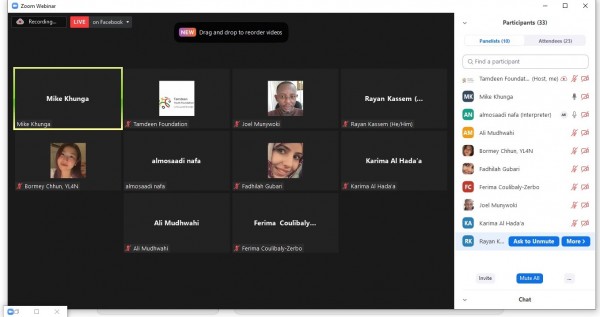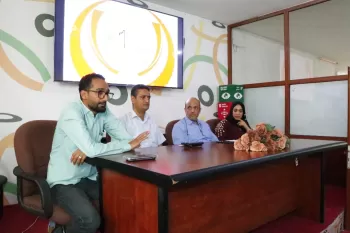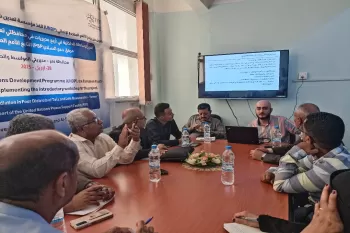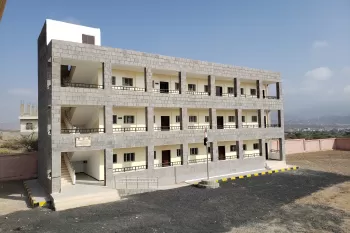On the Occasion of International Youth Day…, Tamdeen Youth Organizes a Meeting About Safe and Sustainable Food Systems from a Comprehensive Perspective
As part of its celebration of International Youth Day 2021, and its belief in the importance of youth abilities and their role in making a better present and future; Tamdeen Youth Foundation, in cooperation with the Scaling-Up-Nutrition (SUN) movement in Yemen, organized a meeting that hosted many local and international experts to talk about safe and sustainable food systems from a comprehensive perspective and the role of Yemen's youth in promoting this at the national level, sensing the importance of this issue as Yemen is one of the countries with poor nutrition, as well as the risk of famine.
According to the UN, this year is the "Year of Action to Respond to the Effects of Food Systems and Nutrition Revealed by COVID-19 Pandemic", considering that this International Youth Day (#IYD), is about a pressing theme, "Transforming Food Systems: Youth Innovation for Human and Planetary Health".
The two-hour ZOOM meeting began with a speech by Tamdeen Youth Foundation, as the coordinator of the “Sun” movement for civil society networks in Yemen, delivered by Mr. Qassim Kamal, Economic Empowerment Director, welcoming all speakers and attendees. He expressed his overwhelming pleasure at the participants' response and their interest in improving the situation of youth in Yemen, considering that the next stage is for youth and hope is placed on them to save the present and make the well-being of the future.
He also highlighted the phases of TYF’s progress, especially its growing interest in youth to improve their reality and conditions from a strategic perspective, concluding by introducing the meeting's facilitator, the Sun Movement's secretariat, Ms. Karima Al-Hadda. He concluded by presenting the meeting facilitator Ms. Karima Al Hada, Planning and Communication Specialist at the Secretariat of SUN.
Creating a Better Human Reality
In turn, Al Hada began with a quick brief review of this year's global food system events. She pointed out that The UN Secretary-General, in September 2019, called on all sectors of society to mobilize more support for the ten-year goals of action, known as the "Decade of Action," aimed at accelerating the achievement of SDGs and the three tracks in this framework.
Al-Hada referred to the impact of Covid-19 pandemic on the progress of achieving the 17 SDGs and the need to work to reduce the impact of this pandemic, reviewing the UN 2021 Food Systems Summit program, and the five tracks on which the UN is working internationally. All these efforts were aimed at creating a better human reality by providing many needs, such as people's access to good nutrition and healthy meals.
Attention to food systems has become the focus of all interventions to find new innovations and innovative solutions to all the problems that effect human and planetary health in general. However, during this year and the next 10 years, many dialogues will be held nationally and internationally, with a view to analysing challenges, exploring promising approaches, discussing sustainable food system paths and solutions, and defining intentions and commitments. There is thus a kind of commitment at three levels, by countries, global events, and local, regional and international institutions. Al Hada added.
Three Solutions to the Transition to Healthy Food Systems
This valuable and fruitful presentation of the UN Food System Summit tracks was followed by important and inspiring interventions launched by the FAO nutritionist - Yemen Office, Mr. Joel Munyuki. He sent important messages in which he referred to three radical solutions to the transition towards healthy food systems, namely, creating demand for healthy and nutritious food, which is the shortest way to move towards healthy food, availability and accessibility of healthy food, as well as creating an enabling environment for healthy nutrition.
Schools and their environment as a platform for a transition towards healthy nutrition
Dr. Ferima Zerbo, head of the nutrition program at WHO-Yemen, highlighted Nutrition-Friendly Schools Initiative and presented it as a unique experience to use the school and its environment as a platform for a transition towards healthy nutrition. She pointed to the importance and role of youth as a platform to participate in innovative solutions, as well as presenting the five issues of food safety.
Transition Towards Sustainable Interventions
As for Fadhilah Gubari, Business Consultant and Member of the International Food System Dialogues, Track 5 Group, she focused her intervention on Track 5 of the Food Systems Summit. She also highlighted a set of interventions, such as promoting local production for local consumption, promoting food systems to create resilience to future crises and pandemics, differentiating food components and their relationship with consumers, as well as national business and nutrition policies and the importance of focusing on innovative interventions and the role of youth.
She pointed out to the importance of youth current role to change the track of these interventions from emergency and humanitarian interventions to sustainable and development-related interventions. Consequently, the need for interventions targeting vulnerable groups such as people living with cancer, kidney failure, the elderly, children, etc., and other alternatives, solutions and healthy food.
Food Systems Response to Climate Change
For his part, the Youth Vice-President for Action Track 5 "Resilience" of the UN Food Systems Summit, Mr. Mike Konja, emphasized the importance of promoting the capacity of food systems to respond to climate change, reviewing some of the issues affecting climate and the environment, such as food preparation.
There Can Be No Talk of Nutrition Apart from Famine
In turn, Mr. Rayan Kassem, West Asia Regional Director for Youth for Nature, spoke about the World Food Systems Summit, saying that we are working to identify problems and solutions for Arab youth to be presented to the upcoming World Food Systems Summit in New York, next September.
Kassem explained that there are three demands for youth around the world, estimated to number more than 20 thousand, to be presented at the summit: a. pressure on decision makers to adopt policies that prevent marketing of food products harmful to health, b. remove obstacles to financing farmers, especially youth, to obtain agricultural land, and c. lift obstacles to accessing information to youth being decision makers, not just consultants.
"We can't talk about nutrition away from famine, like in Yemen, where many students go to school without food because they don't have, and they don't care about the quality of food if it is available," Kassem said.
He wondered, if the UN itself provides cheap aid to Yemen, benefiting from the support of some countries, such as sugar, oil, white bread and others, known to be among the most health - damaging food. How are we going to demand healthy food systems? This solution may be provisionally acceptable, but the Yemen crisis has been prolonged, and this must be delivered to decision makers and put pressure on them.
Learning and Sharing
About (SUN), Ms. Bromi Chun, stressed the importance of a platform for learning, sharing and providing solutions for raising nutrition, as well as the need to initiate national dialogues on food systems, particularly for youth.
Youth Represents Empowerment
The Consultant for Public Health and Epidemiology, Dr. Ali Al Medwahi, concluded this meeting by referring to the view of the Ministry of Public Health and Population on the issue of nutrition and youth in Yemen, considering that nutrition is a top priority and not only a priority. It is fortunate that this year's International Youth Day will adopt the issue of nutrition.
For us, in the Ministry of Health, we look at three key indicators of this kind namely, availability, access and use. Availability provides safe food for proper nutrition, and that food is available to all people without discrimination. We face many challenges related to Yemen’s geography and demography, where there are more than 133 communities in a country of about 31 million. The dispersal of the population in this way disperses resources. And the security situation, which in turn poses very significant challenges that is impeding access to normative nutrition services. As for usage, it means modifying behavior in food use, and it is usually worked to establish it in this age group, which is the youth group. He added
“We are keen to provide an effective model in providing health and nutrition services. We seek in the health sector to work with the private sector and the civil society, in order to have a culture of optimization to be present at different levels and groups of society, but the youth represent the category of empowerment, as change in the behavior of youth changes the shape of the future. And in order to reach empowerment, youth must be prepared, and the preparation must be early, which brings us back to the nutrition-friendly schools initiative.
Referring to the importance of the Coordinating Secretariat of SUN, as it brings together relevant sectors, Al Medwahi concluded: "Therefore, we seek to work more with partners to ensure that these alternatives are for what people demand and need, and this comes within the framework of the Usage. In order to reach it, the state of awareness must be linked to the state of behavior and not just awareness, as well as motivation and the enabling environment.
All participants did not forget to express their thanks and gratitude to Tamdeen Youth Foundation for its efforts to organize this event, its tangible interest in the youth, and its work on normative nutrition services, and the SUN secretariat’s efforts to raise nutrition levels in Yemen.
The Scaling Up Nutrition (SUN) movement is a global movement led by 54 countries to improve nutrition. Four networks (business, civil society, donors, and the UN system) support these countries by bringing together groups of stakeholders to increase and improve resources and align actions behind country efforts. As of 2021, Tamdeen Youth Foundation is the coordinator of the “Sun” movement for civil society networks in Yemen
It should be noted that Yemen joined the SUN movement in November 2012, and the Steering Committee was established under the leadership of the a of Planning and International Cooperation.




